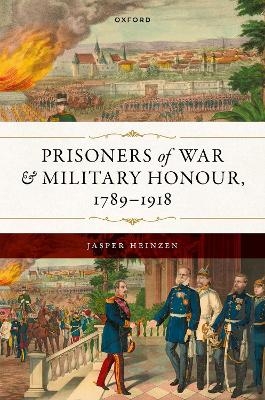
Prisoners of War and Military Honour, 1789–1918
Seiten
2025
Oxford University Press (Verlag)
978-0-19-287116-9 (ISBN)
Oxford University Press (Verlag)
978-0-19-287116-9 (ISBN)
- Noch nicht erschienen (ca. Februar 2025)
- Versandkostenfrei
- Auch auf Rechnung
- Artikel merken
In the long nineteenth century, officers were held as prisoners of war, but it meant pawning personal honour in exchange for freedom of movement and other privileges-in-captivity. Jasper Heinzen investigates how captives, statesmen, and humanitarians understood honour in this context, and the implications on our understanding of early modern war.
Early in the modern period, prisoners of war with the rank of officer or equivalent had the right to petition for parole. By effectively pawning their personal honour, they were able to purchase freedom of movement and other privileges-in-captivity. Increasingly, other ranks and civilians claimed a right to parole too.
Based on material from close to thirty Australian, British, Dutch, French, German, and Swiss archives, Jasper Heinzen investigates the role and implications of honour-based agreements between prisoners of war and their captors in western European warfare. Across a range of ego documents, ministerial memoranda, the minutes of Masonic lodges, and prisoners' petitions, as well as a substantial body of published material, he demonstrates how captives, statesmen, and humanitarians understood honour in the 'long nineteenth century', how they negotiated national differences, and whyparole d'honneurcontinued to matter as a code of conduct into the First World War. In so doing, the book demonstrates the dichotomy between 'good' codes of conduct prevalent in the eighteenth century and the practices of modern warfare—perpetuated by a substantial amount of scholarship—to be a false one. Explaining the longevity of parole in this novel way raises important questions about the so-called 'military Enlightenment', the excesses of the world wars, total war, and the practices and codes of modern warfare.
Early in the modern period, prisoners of war with the rank of officer or equivalent had the right to petition for parole. By effectively pawning their personal honour, they were able to purchase freedom of movement and other privileges-in-captivity. Increasingly, other ranks and civilians claimed a right to parole too.
Based on material from close to thirty Australian, British, Dutch, French, German, and Swiss archives, Jasper Heinzen investigates the role and implications of honour-based agreements between prisoners of war and their captors in western European warfare. Across a range of ego documents, ministerial memoranda, the minutes of Masonic lodges, and prisoners' petitions, as well as a substantial body of published material, he demonstrates how captives, statesmen, and humanitarians understood honour in the 'long nineteenth century', how they negotiated national differences, and whyparole d'honneurcontinued to matter as a code of conduct into the First World War. In so doing, the book demonstrates the dichotomy between 'good' codes of conduct prevalent in the eighteenth century and the practices of modern warfare—perpetuated by a substantial amount of scholarship—to be a false one. Explaining the longevity of parole in this novel way raises important questions about the so-called 'military Enlightenment', the excesses of the world wars, total war, and the practices and codes of modern warfare.
Jasper Heinzen completed his undergraduate studies at the Universities of Otago and Canterbury in New Zealand before obtaining an MPhil and PhD from the University of Cambridge. He is a senior lecturer in modern European history at the University of York. Research for the book was graciously supported by a Marie Curie Fellowship at the University of Bern, a EURIAS Fellowship at the Paris Institut d'études avancées, and a Leverhulme Fellowship, as well as a number of smaller grants.
Introduction
1: The Ties That Bind: Honour and the Laws of War
2: Honour and the Economy of Credit in the Age of Revolutions
3: Honour Betwixt and Between: Parole in Wars of the Mid-Nineteenth Century
4: Honour in a World of Camps
Epilogue
| Erscheint lt. Verlag | 6.2.2025 |
|---|---|
| Verlagsort | Oxford |
| Sprache | englisch |
| Maße | 156 x 234 mm |
| Themenwelt | Geschichte ► Allgemeine Geschichte ► Neuzeit (bis 1918) |
| Geisteswissenschaften ► Geschichte ► Regional- / Ländergeschichte | |
| Geschichte ► Teilgebiete der Geschichte ► Militärgeschichte | |
| ISBN-10 | 0-19-287116-1 / 0192871161 |
| ISBN-13 | 978-0-19-287116-9 / 9780192871169 |
| Zustand | Neuware |
| Informationen gemäß Produktsicherheitsverordnung (GPSR) | |
| Haben Sie eine Frage zum Produkt? |
Mehr entdecken
aus dem Bereich
aus dem Bereich
Giordano Bruno - ein ketzerisches Leben
Buch | Hardcover (2024)
C.H.Beck (Verlag)
CHF 41,85
das dramatische 16. Jahrhundert
Buch | Hardcover (2024)
Rowohlt Berlin (Verlag)
CHF 47,60


